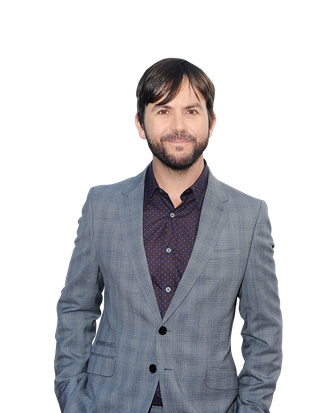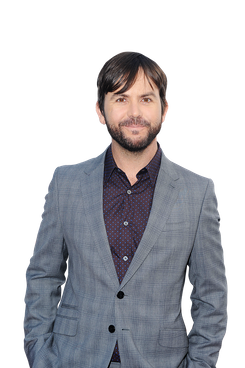

When FX adapted Jason Gann’s Australian cult hit Wilfred for American audiences, he and producer David Zuckerman (Family Guy) completely revamped the show, offering nuance and charm to the original’s “man who sees the neighbor’s dog as a smoking, cursing, dude-in-a-dog-suit” concept. Now the dark comedy, which stars Elijah Wood as said man and Gann as said dude-in-a-dog-suit, is a ratings success at the cable network. Vulture spoke with Gann ahead of tonight’s season finale about his decision to bring Wilfred to America, how the U.S. version is different from the original, and the challenges of writing for an imaginary man-dog.
When Wilfred was adapted for American TV, you were reluctant to get back in the dog suit. Why was that?
It was a mixture of things. Even though I loved the character of Wilfred, I didn’t really enjoy the shooting of the original; it just wasn’t a perfect mix of personalities, and it wasn’t a lot of fun. And in Australia, I created two shows, Wilfred and Mark Loves Sharon, and Mark Wary, a character whom I’m even more well known for in Australia, he’s a lead sportsman and drives hot cars and wears great clothes and has chicks all around him. We were going to go out here [in the U.S.] with that character first, so when the choice came down to being stuck in an animal suit or being a sexy sportsman, I had no desire to get back in the suit.
If I’m being completely honest, mate, I actually got down on my knees and prayed for this thing I was about to do. I was about to get in this animal suit and be out on the street in public on Venice Beach, and potentially make a fool of myself in front of the whole world. I was terrified. It’s one thing to do it in front of a small following of a couple hundred thousand people in Australia, but it’s another to do it in front of millions. So I was scared. And then I went out and the crew was just so supportive of me and the network made me feel so comfortable.
This version of the show isn’t all that close to the Australian version. When you decided to adapt the show, why did you make the decision to go in such a different direction?
David Zuckerman pitched this version of it, and I loved it. What David said to me is that he wanted to make a different vehicle for this character that he loved. He actually wanted to make both shows be able to fit side by side with each other and complement each other. I had no interest in making the same show again, just surrounded by people with different accents. You always want to do something better and different. I always thought the show could have been better. So it was a good opportunity to expand on this character, and I think I’ve done that because Wilfred has a lot more sides to his character; he’s a lot more fun in this version, he’s a lot more maniacal, adopting different characters within his character, and it’s a bit more Alice in Wonderland.
We get to know a lot more about all the characters in this version than we did in the original.
Yeah, we didn’t have a lot of rules in the Australian version. There are more rules in this version, and David thought American audiences need rules that they can understand so they can get the show. We were unable to sell the Australian version anywhere else in the world. I know IFC has it, but to my knowledge Renegade [Films] gave them the show; if they’ve been paid anything, I certainly don’t know about it. So the show was unable to be sold anywhere, so something wasn’t working.
The Australian Wilfred is sinister and mean most of the time. When you were reassessing the character for American TV, what did you want to change about it?
I didn’t know at the time that I wanted to make massive changes to the Wilfred character. There was just something about how I looked in the suit with Elijah, and I said to David, “I really like that image; it’s kinda like Wilfred is his bodyguard.” It reminded me of that movie My Bodyguard. And the idea of Wilfred being a protector and a guide as much as being a saboteur really fascinated me. That’s something Elijah brought out in me. Elijah’s a really likable guy. What Elijah brings to the character [of Ryan] really informs the relationship.
How does the rest of the world see Wilfred? Do they see him smoking a cigarette? How do you guys sort all that metaphysical stuff out in the writers’ room?
Yeah, he doesn’t have a cigarette. We use a fair bit of poetic license; if he’s drinking a cocktail, he might be [in reality] lapping from a bowl of water. In Australia, I had him at one stage driving a backhoe to dig a hole, and David thought that was too much a stretch, so he had Wilfred digging with a shovel. We have what we call “Wilfred’s Wilfred” and “Ryan’s Wilfred.” [The latter is] psychological, how much of Ryan is creating all this for his own good or for his own destruction, and within Wilfred’s character, how much is he doing for his own selfish needs, like getting laid or getting a meal.
How tough is it to keep all of this straight and keep Wilfred relatively grounded as a character?
It’s a tough show to write. There’s lots of pitches that I have of things that I want Wilfred to do that don’t all stick. This show is a lot more complex to write than the Australian version; every story is about Ryan, and the story about Ryan has to work first, almost before Wilfred gets to do anything funny. The hard part is adding the Wilfred funny stuff around Ryan’s story, because I could have a hilarious piece of business for Wilfred to do, but if I can’t justify it in Ryan’s reality, then it doesn’t get in.
As the creator of the character and show, is it tough giving up that kind of control?
In a word? Sometimes [chuckles]. Look, I couldn’t have made this show on my own, so I needed someone with more experience and a different set of creative eyes to drive it. David’s often said to me that he’s been amazed that I’ve been open to so many changes, and that’s kind of been the deal. There’s a lot of things that don’t get in, but I’m learning to trust the people around me, because people are loving it and it is a collaboration. Overall, I’m happy.




